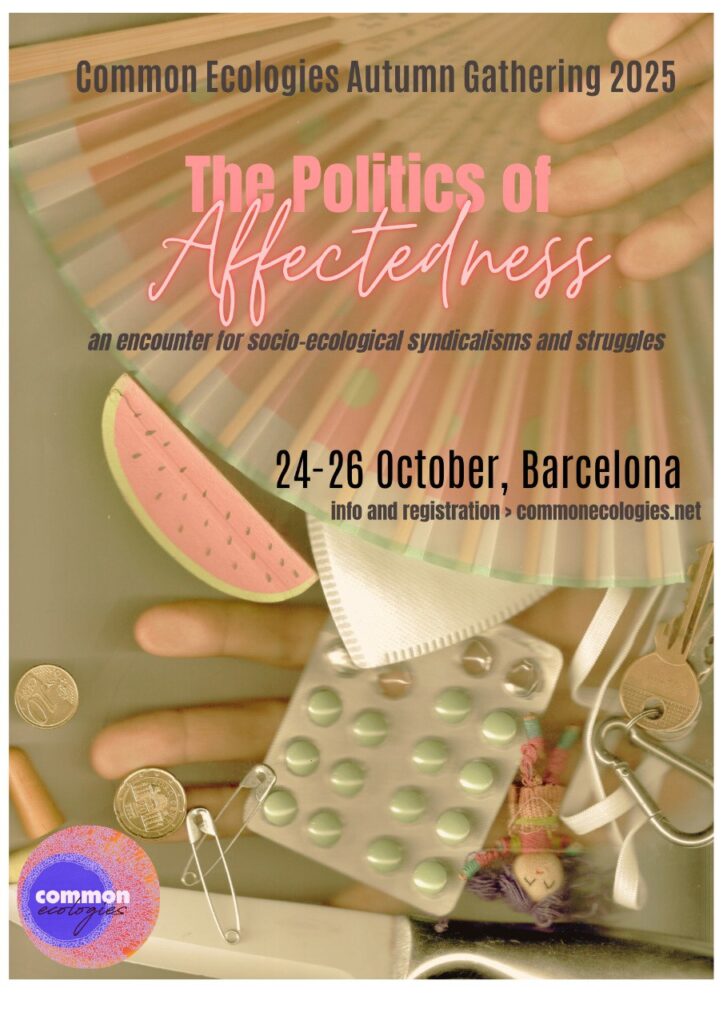This October, we gather in Barcelona for three days of sharing, strategizing and synchronizing around the question of how to organize in a time of polycrisis.
Can a politics of affectedness be the starting point of collective care, social struggles, and international solidarity?
The compounded climate and ecological crisis is becoming more concrete every day. Disaster, decline, and the wars and profiteering they give rise to, are forcing us to look for new horizons for movement organising, one based on the politics of affectedness.
With local and international allies, we will explore how socio-ecological struggles are no longer about predictions and warnings, but about accelerating affectedness. We’ll be articulating these perspectives through sessions based on our strand work: Earthcare, Ecosocial Education, and Ecosyndicalism, as well as open spaces for learning, liaising, socializing, and dreaming.
The programme
This is an in-person event. Online attendance is not possible.
FRIDAY, 24.10
- Early afternoon – WELCOME & REGISTRATION
- Mid-afternoon – RURAL-URBAN STRUGGLES AND CONNECTIONS (facilitated by the Earthcare strand)
The stark divide between rural and urban populations and spaces is coming back at us with a vengeance today: far-right votes concentrating in the countryside and small towns, as well as extractivism and exploitation. The urban-rural divide is as stark and urgent to address as the one between the Minority and Majority worlds, as these mirror each other. How are different movements working on addressing this disconnect, building a radical politics against extraction, exploitation, and disenfranchisement? What strategies can we identify and develop in this sense, and how do we link these across regions? From agrarian to labour to climate to antiracist to transfeminist and other struggles, how do we connect the dots in ways that challenge the bourgeois capitalist status quo? - Evening – POLITICS OF AFFECTEDNESS #1: THE COST OF LIVING VIA FOOD AND HOUSING
Most people experience the socio-ecological crisis less as extreme disasters and more as a gradual erosion of the economic and ecological conditions of life. What does it take to politicize this affectedness? What is the scope for movements of people affected by increasing food prices caused by floods, droughts, soil erosion, pandemics, pollinator extinction, and the attempt to profit from them? How can we build movements of people affected by overheating homes, crumbling infrastructure, and houses that become uninsurable and unsellable due to increased risks of floods and fires? How do we preempt reactionary struggles of homeowners and consumers, and avoid the passive adaptation of everyday life to an unjust and violent degradation of everyday life that starts with the most vulnerable?
Saturday, 25.10
- Late morning / early afternoon – WAYS INTO ECOSOCIAL EDUCATION (facilitated by the Ecosocial Education strand)
Our public education systems are mostly underfunded, and their curricula are inadequate to these times of socioecological breakdown and upheaval. How do we build ways of getting the important knowledge to young people and into schools? How do we work with the various ways in which students, as well as school and local communities, are affected by our ongoing crises? In this session, we present, celebrate, and workshop our guidebook ‘Ways into Ecosocial Education’ for the very first time. This book offers tools and tactics for bringing radical ecosocial education into schools, as teachers, families, institutional actors, students, and activists, based in practices and movements across the Eastern Mediterranean, the Iberian Peninsula, the British Isles, German-speaking countries, and South Africa. All welcome—bring your families and snacks, as this will be a kid-friendly event in an outdoor eco-educational space with a picnic at the end! - Mid-afternoon – ECO-UNIONISM, FEMINIST AND ANTI-RACIST SYNDICALISM, BIOSYNDICALISM (facilitated by the Ecosyndicalism strand):
Capitalists and states direct the destruction of the world, but workers get the task of implementing it. Herein lies a mostly untapped potential for refusal and disruption. How can the way workers and their communities are affected by the green transition, toxicity, pollution, and workplace heat be leveraged in the struggle for a transformation of work and abolition of ecocidal work? Learning from feminist and anti-racist syndicalism, ecological unionism, whole-worker-organizing, bargaining for the common good, and the idea of biosyndicalism, this session explores the potentials for struggles within, against, and beyond waged work in the age of polycrisis. In this session, we will also discuss and celebrate the publication of our English translation of Territorio Doméstico collective’s Biosyndicalisms from Below. - Evening – POLITICS OF AFFECTEDNESS #2: ANTI-EXTRACTIVIST AND PSYCHO-SOMA-TECH STRUGGLES
Some of us experience socio-ecological crisis through screens as doomsday news, while others experience it as a lithium mine that threatens our village, or indeed as a political coup or war that opens the way for extractivism. Cloud capitalism likes to have us think the digital and the material are disconnected, but we know they are not. How do we build alliances across how technological extractivism affects us both materially and psycho-physically? It’s high time for a new technopolitics – built on care, repair, refusal, and resistance – in this age when the liberal Silicon Valley bros have revealed themselves as technofeudalists open to fascism. In this session, we speak about digital enclosures and extractivisms, of psycho-soma-tech health and care, mapping out the challenges for organising across online and embodied spaces.
Sunday, 26.10
- Late morning – OPEN SESSIONS
During the gathering, we want to give attendees a space to host their own mini-sessions, organize a discussion group to take a deep dive into a topic of collective interest, or get together to plan and strategize based on what they’ve heard and learned during the previous days. We’ll collect suggestions for the open sessions during the first two days of the gathering, but if you already have an idea of the session you’d like to organize, please get in touch via email.
- Early afternoon – POLITICS OF AFFECTEDNESS #3: CONFLICT AND DISPLACEMENT
In an interconnected world, no conflict or crisis occurs in isolation: from the geopolitical factors that feed into a “local” conflict, to the fallout from social or political crises spilling across arbitrary state borders. If we want to respond in a meaningful way to conflict and crisis abroad, it’s imperative we find ways to relate to these events and the people directly affected by them. We have to be mindful not to make it about ourselves, but at the same time, knowing that the pursuit of wars, resource extraction, and dictatorship elsewhere only ever brings bad news at home. We see European countries drastically cut migrant numbers, whilst globally conflict and catastrophe are skyrocketing: people affected by the worst are kept out of our sight and mind, except as scapegoats. Knowing that all those affected by displacement and conflict are key allies and agents to learn from, we use this session to talk about ways to build solidarity, global justice, and open borders across social and ecological crises. - Mid-afternoon – CLOSING ASSEMBLY


